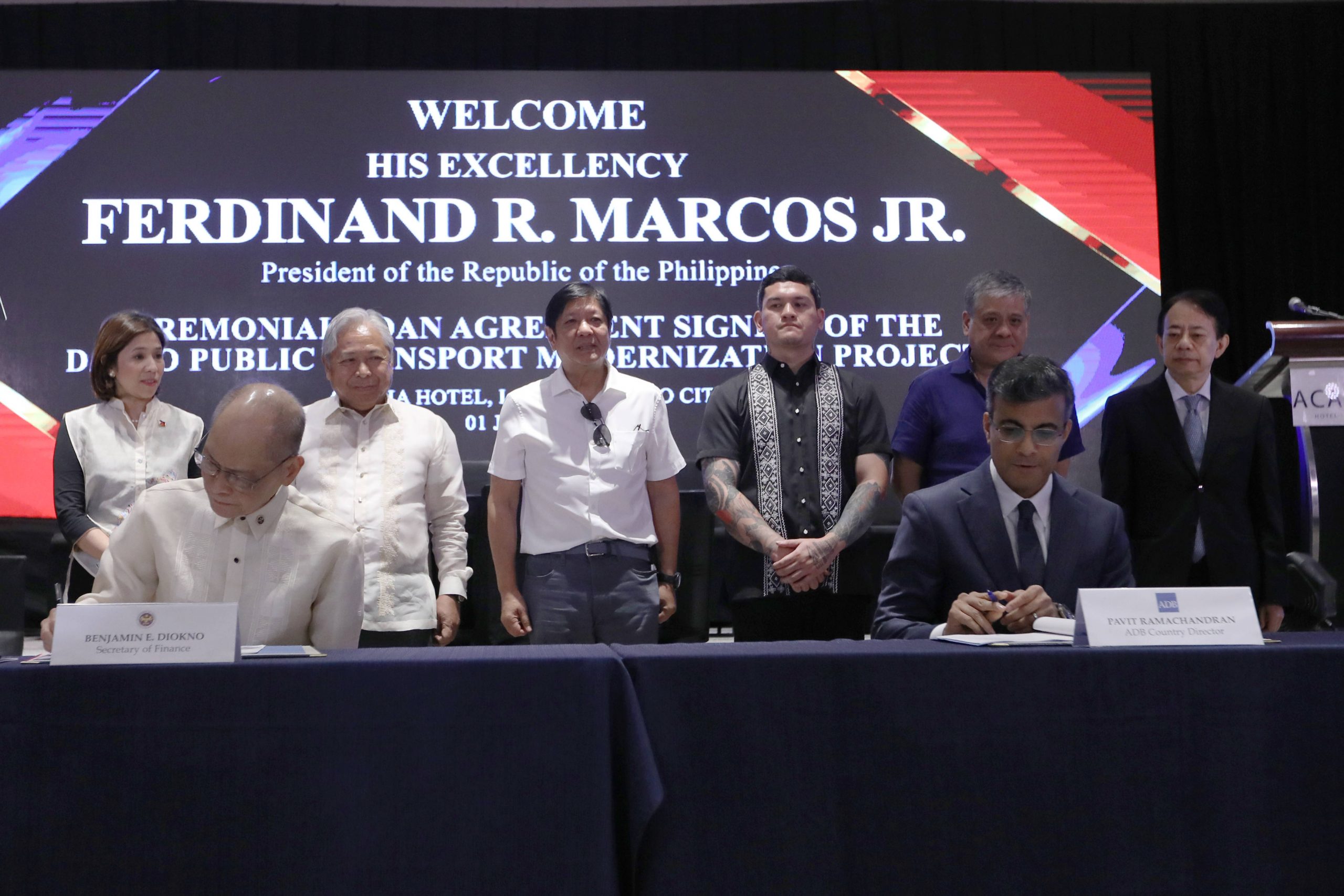$1.710 B loan agreement inked for DavaoBus project
THE DAVAO Public Transport Modernization Project (DPTMP), dubbed DavaoBus, is officially a go with the singing of the loan agreement between the Department of Finance (DoF) and the Asian Development Bank (ADB) last Saturday, July 1, 2023, at the Acacia Hotel, Davao City.
DavaoBus is projected to be in partial operation by the fourth quarter of 2024 and in full operation by 2025.
Witnessed by President Ferdinand R. Marcos, Jr. and ADB President Masatsugu Asakawa, the $1.710 billion loan agreement was signed by Finance Secretary Benjamin Diokno and ADB Philippines Country Director Pavit Ramachandran.
The loan comes from three sources, with a big chunk of it coming from ADB Ordinary Capital Resources at $1.014 billion and the rest from the Green Climate Fund (GCF) under the Association of Southeast Asian Nations (ASEAN) Catalytic Finance Facility Green Recovery Program (ACGF-GRP) for $50 million and ACGF Regular under the ASEAN Infrastructure Fund (AIF) for another $10 million.
President Marcos, Jr., in his keynote address, expressed his deep gratitude to ADB for being “a long-time development partner of the Philippines.”
The President also reiterated his commitment to support the DavaoBus project and all other development initiatives from the hometown of his Vice-President, Sara Z. Duterte, who was the project’s champion when she was still the Davao City mayor.
Vice-President Duterte, who did not miss the important event that would realize her dream of a modern bus system for Davao City, introduced President Marcos, Jr. before he delivered his keynote address.
Finance Secretary Benjamin Diokno said the DavaoBus project is the first in the Philippines and will serve as a model for other cities in the country.
“It will change the way we live and the way we travel in the country,” he added.
According to the project briefer given during the signing ceremony, the DavaoBus project is a bus-based transport system “designed to be safer, more efficient, reliable, and accessible than existing modes”.
It will provide a “consistent and high level of service to passengers with well-maintained and air-conditioned vehicles, fixed headways, operating schedules, formal bus stops, and an automated fare collection system.”
It is envisioned to “significantly reduce the number of vehicles and disembarkations on the road, leading to reduced congestion and travel times.”
It will likewise “reduce carbon and noise emissions through the decreased number of vehicles and the introduction of electric vehicles.”
1,105 total buses
The estimated number of buses under DavaoBus is 1,105, including 386 18-meter articulated electric buses, 531 12-meter regular diesel buses, and 188 9-meter diesel buses.
These buses will service a total length of 672 kilometers with a system designed to operate on a four-tier hierarchical structure: (1) Metro Davao – core services that connect all major commercial centers; (2) DavaoFeeder – 9 routes that link smaller centers and dispersed populations; (3) DavaoInter – 8 routes that connect inner urban areas to the Central Business District (CBD); and (4) DavaoLocal – links outer rural areas with integrated terminals.
There will be three terminals: one in Bunawan, one in Calinan, and one in Toril. There will be 1,074 bus stops all over the city with fixed operating schedules.
A driving school will also be established in Calinan to train bus drivers in driving these modern electric buses.
Transport Secretary Jaime Bautista, who gave an overview of the project, committed the full support of the Department of Transportation (DoTr) to give Davao City “a truly modern bus system akin to other cities around the world.”
“DavaoBus is a landmark initiative that will greatly improve the transport service for residents, workers, and visitors to the city,” Bautista stressed.
Biggest ADB loan
ADB president Masatsugu Asakawa, in his message of commitment, said that the loan is “the biggest in the history of ADB” for the Philippines and considered one of the bank’s major investments in public transport development, which signifies ADB’s faith in the Philippines and in Davao City.
Mayor Sebastian Z. Duterte, who gave the welcome remarks during the signing ceremony, committed counterpart funds from the city government for the Social Development Program (SDP) to help those displaced and adversely affected by the transport modernization project.
The National Economic and Development Authority (NEDA) Board first approved the project in 2019 for Php 18.6 billion and re-approved this year for Php 73.4 billion to reflect the changes in scope, increase in cost, and extension in the timeline.
Aside from the ADB loan, the DavaoBus project will also be supported with funds from the Philippine government and the City Government of Davao.

